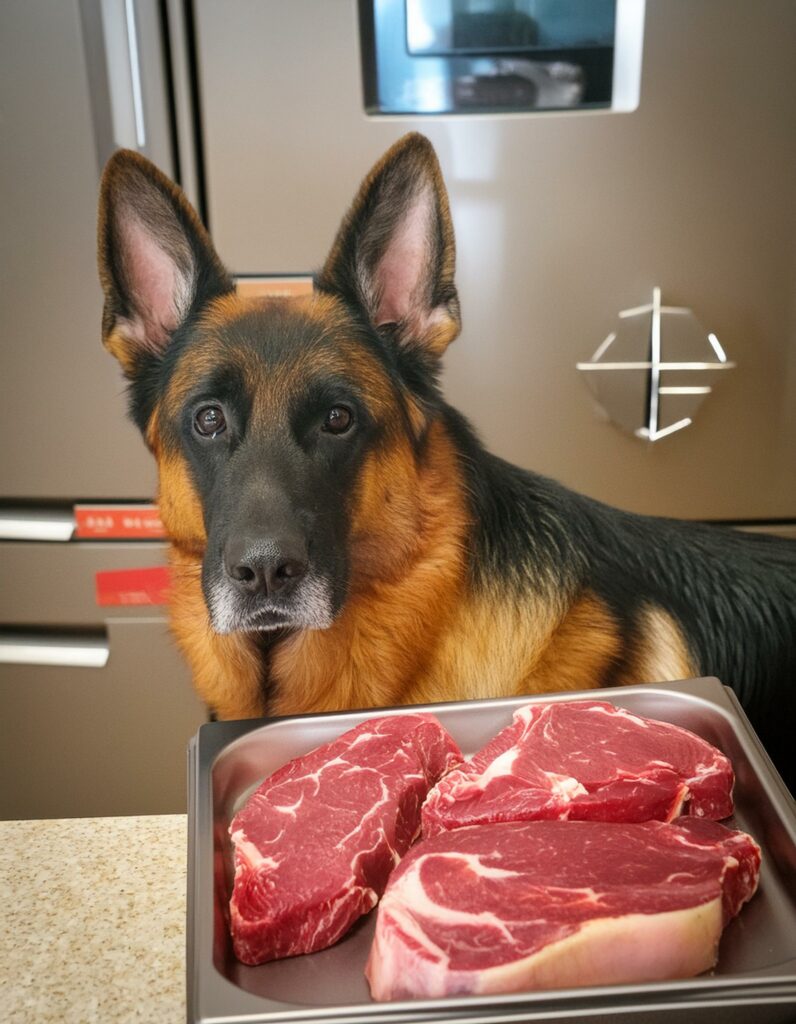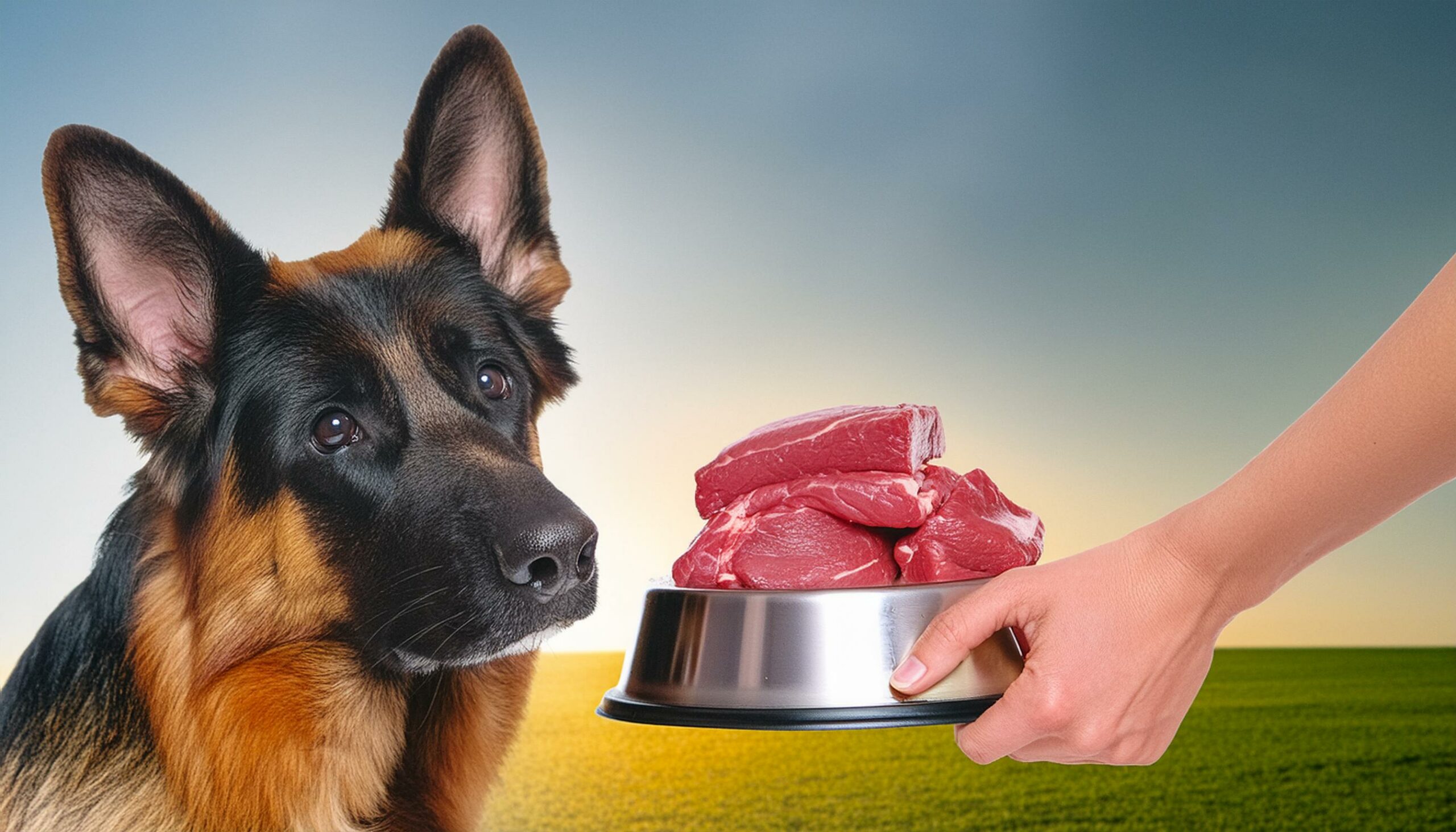German Shepherds are not just pets; they’re loyal companions and, often, members of the family. As responsible pet owners, we constantly seek ways to ensure the health and well-being of our furry friends. One question that frequently arises is whether it’s safe to incorporate raw meat into a German Shepherd’s diet. In this comprehensive guide, we’ll delve into the intricacies of feeding raw meat to German Shepherds, exploring the benefits, potential risks, and guidelines for a balanced diet.
Understanding the Diet of German Shepherds
1. The Natural Diet of German Shepherds
German Shepherds, like their ancestors, are carnivores at heart. Their evolutionary lineage traces back to wolves, who thrived on a diet primarily composed of raw meat, bones, and organs. This genetic heritage influences their dietary needs and preferences.
2. Nutritional Requirements
To thrive, German Shepherds require a diet rich in essential nutrients such as protein, fats, vitamins, and minerals. These nutrients play a crucial role in supporting their overall health, including muscle development, immune function, and coat quality. Therefore, it’s imperative to provide them with a diet that mirrors their natural nutritional requirements.
Pros and Cons of Feeding Raw Meat

3. Benefits of Raw Meat
- Improved Digestion: Raw meat contains natural enzymes and probiotics that support optimal digestion, reducing the likelihood of gastrointestinal issues such as bloating and constipation.
- Enhanced Nutrient Absorption: The bioavailability of nutrients in raw meat is higher compared to processed or cooked foods, allowing for better absorption and utilization by the body.
- Healthy Skin and Coat: The high protein content in raw meat promotes healthy skin and a glossy coat, minimizing issues like dryness, itchiness, and shedding.
4. Risks of Raw Meat
- Bacterial Contamination: Raw meat, particularly poultry and ground meats, may harbor harmful bacteria such as Salmonella, E. coli, and Listeria. These pathogens pose a risk not only to the dog but also to other household members.
- Potential Nutritional Imbalance: Without proper planning and supplementation, a raw meat diet may lack essential nutrients such as calcium, phosphorus, and certain vitamins. This imbalance could lead to nutritional deficiencies and health issues over time.
- Choking Hazard: Bones, if not appropriately sized or supervised during consumption, may splinter and cause choking, gastrointestinal obstructions, or dental fractures.
Guidelines for Feeding Raw Meat Safely
5. Consultation with a Veterinarian
Before embarking on a raw meat diet, it’s crucial to consult with a qualified veterinarian. A veterinarian can assess your German Shepherd’s individual health status, dietary needs, and potential risks associated with a raw meat diet. They may also recommend specific supplements or adjustments to ensure a balanced and nutritionally complete diet.
6. Quality Sourcing
When selecting raw meat for your German Shepherd, prioritize quality and safety. Opt for human-grade meats from reputable suppliers or butchers known for their stringent quality control measures. Avoid meats that contain additives, preservatives, or artificial ingredients, as these may compromise the nutritional integrity of the diet.
7. Balanced Diet
To prevent nutritional deficiencies or imbalances, aim for variety in your German Shepherd’s raw meat diet. Incorporate a diverse range of protein sources such as beef, poultry, lamb, and fish, as well as organ meats like liver, kidney, and heart. Additionally, include raw meaty bones as a source of calcium, phosphorus, and dental enrichment.
8. Safe Handling Practices
Practice proper hygiene and food safety protocols when handling raw meat to minimize the risk of bacterial contamination. Thoroughly wash your hands, utensils, and food preparation surfaces before and after handling raw meat. Store raw meat securely in the refrigerator or freezer to prevent cross-contamination with other foods.
Transitioning to a Raw Meat Diet
9. Gradual Transition
When transitioning your German Shepherd to a raw meat diet, do so gradually to allow their digestive system to adapt. Start by substituting a small portion of their current diet with raw meat and gradually increase the proportion over several days or weeks. Monitor your dog’s stool consistency, energy levels, and overall well-being during the transition period.
10. Monitoring Health
Throughout the transition and beyond, closely monitor your German Shepherd’s health and behavior for any signs of dietary intolerance or adverse reactions. These may include vomiting, diarrhea, lethargy, excessive itching, or changes in appetite. If any concerns arise, consult your veterinarian promptly for guidance and support.
Conclusion
Feeding raw meat to German Shepherds can be a contentious topic among pet owners, with passionate advocates and skeptics on both sides. While raw feeding proponents tout its numerous potential benefits, detractors raise valid concerns about safety, hygiene, and nutritional adequacy. Ultimately, the decision to feed raw meat should be made thoughtfully, taking into account individual factors such as the dog’s health status, dietary preferences, and lifestyle. By following the guidelines outlined in this article and working closely with a veterinarian, you can provide your German Shepherd with a balanced, nutritious diet that promotes optimal health and vitality.
FAQs (Frequently Asked Questions)
Can all German Shepherds safely eat raw meat?
While many German Shepherds thrive on a raw meat diet, individual tolerance may vary. Consult with your veterinarian to determine if it’s suitable for your dog based on their health status and dietary needs.
How often should I feed raw meat to my German Shepherd?
The frequency of raw meat feedings depends on factors such as age, activity level, and overall health. Your veterinarian can provide personalized recommendations tailored to your dog’s specific requirements.
Are there any alternatives to feeding raw meat?
Yes, there are commercially available raw food diets and high-quality kibble options formulated to meet the nutritional needs of German Shepherds. These alternatives offer convenience and nutritional balance without the concerns associated with raw meat handling.
Can feeding raw meat cause aggression in German Shepherds?
There’s no scientific evidence to suggest a direct correlation between raw meat consumption and aggression in German Shepherds. Aggression is a complex behavior influenced by various factors, including genetics, upbringing, and socialization.
How can I ensure my German Shepherd’s raw meat diet is balanced?
Work closely with a veterinary nutritionist or consult with your veterinarian to create a balanced raw meat diet tailored to your dog’s specific needs. Incorporating a variety of protein sources, organ meats, and appropriate supplements can help ensure nutritional adequacy and prevent deficiencies.
